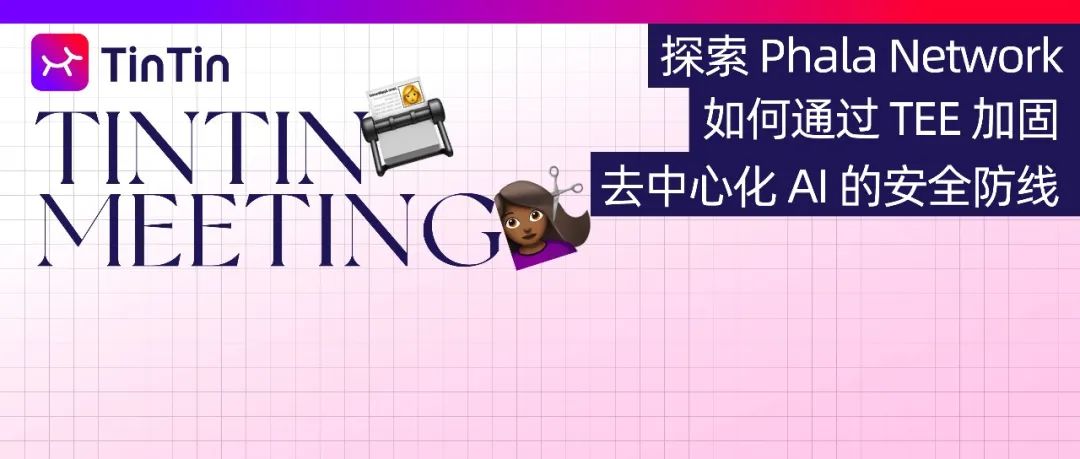
Driven by the wave of the digital age, blockchain technology is accelerating the integration of decentralized applications (DApps) and artificial intelligence (AI) with its revolutionary potential, becoming the forefront of technological innovation. As a pioneer in this field, Phala Network has introduced cutting-edge trusted execution environment (TEE) technology, leading a new trend in technological innovation. This technology not only greatly enhances the security and privacy protection of applications, but also provides developers with a powerful set of tools that make it easy to build and deploy the next generation of decentralized solutions.
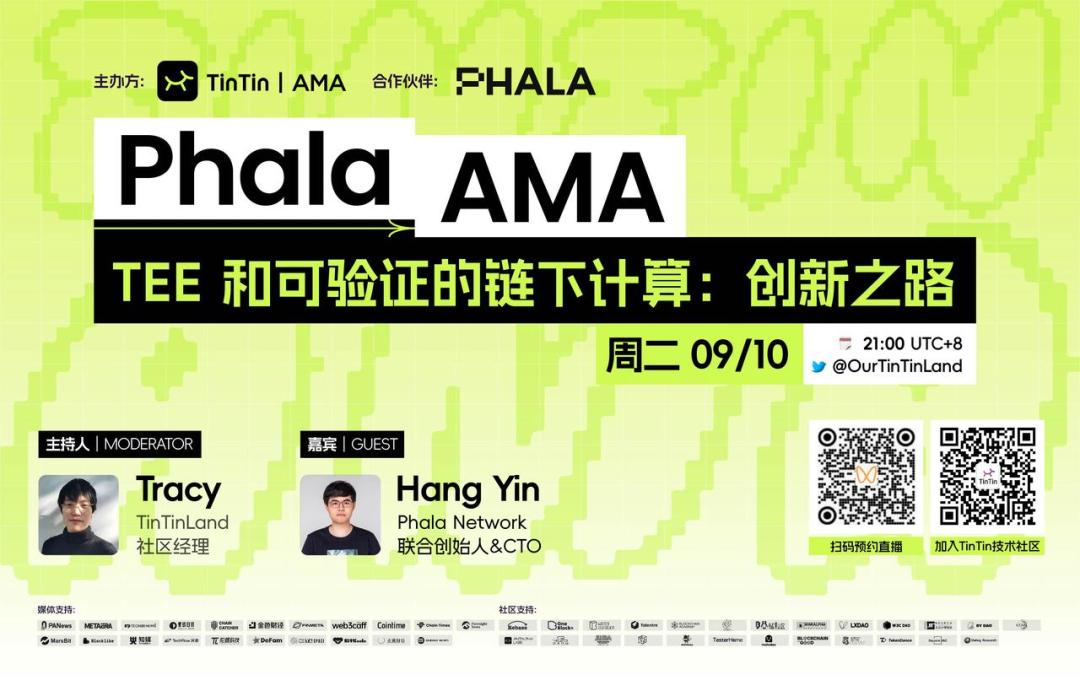
Recently, Phala Network has further consolidated its leading position in secure computing and decentralized AI through strategic alliances with partners such as Hyperbolic, Aligned Layer , and Theoriq . These collaborations not only improve the security and scalability of the platform, but also open up new ways for AI agents to interact with blockchains, providing a more secure and efficient guarantee for the future development of decentralized AI applications. By integrating Intel TDX and GPU TEE, Phala Network's TEE infrastructure provides solid support for running complex AI applications and promotes the advancement of decentralized technology in data security and privacy protection.
Phala Network's core competitiveness lies in its AI coprocessor, which makes it possible to perform off-chain computing while ensuring data integrity and user privacy. By providing user-friendly software development kits (SDKs) and tools, Phala Network greatly simplifies the transition from Web2 to Web3, giving developers the ability to transform existing applications into decentralized applications. At the same time, the platform's strong support for decentralized AI development has laid a solid foundation for building a smarter and more autonomous Web3 ecosystem.
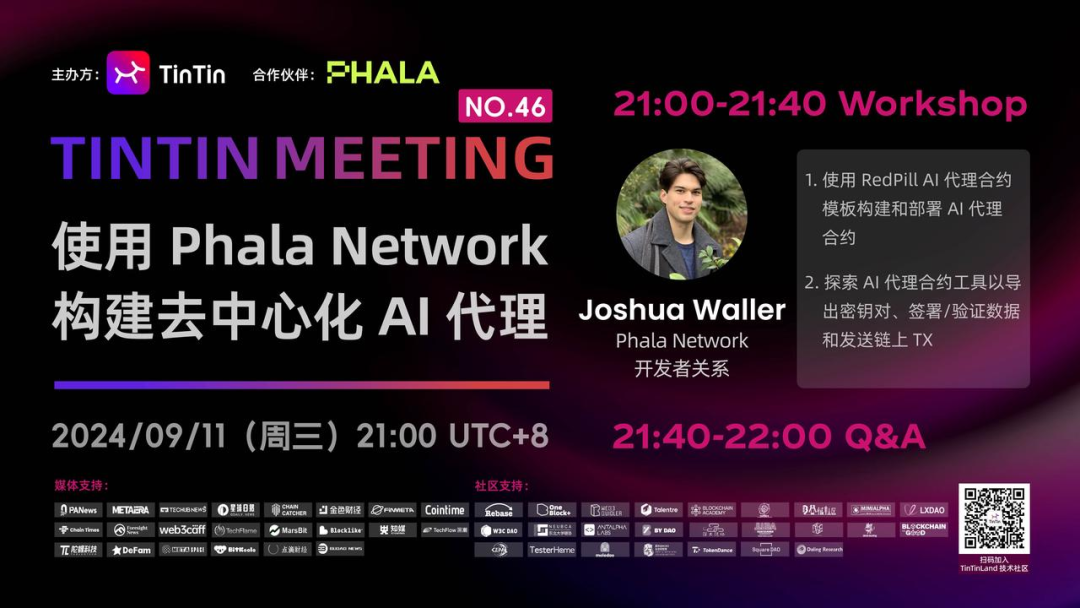
To further explore and share these cutting-edge technologies, TinTinLand was honored to have Hang Yin, co-founder and CTO of Phala Network, and Joshua Waller, head of developer relations at Phala Network, at the TinTinAMA on September 10 and TinTinMeeting on September 11. These two events attracted enthusiastic participation from more than 11,000 participants.
As these technologies continue to advance and improve, we can expect more innovative decentralized applications and AI solutions to emerge in the future, which will bring higher levels of control, security, and privacy to users. Phala Network is at the forefront of this historic change with the vision of promoting a more open, transparent, and decentralized future.
Friends who missed the event can click to replay 👇
🔗 TinTinAMA Twitter Space:
https://twitter.com/i/spaces/1OwxWNyRMZjJQ
🔗TinTinMeeting YouTube:
https://youtube.com/live/udYQ9DIbGYM?feature=share
Phala Network: Breaking through blockchain limitations and leading decentralized AI innovation
Faced with the limitations of blockchain technology in handling complex calculations, data access, and privacy protection, Phala Network has proposed innovative solutions. The team recognizes the limitations of existing blockchains, especially the need for high-performance computing, limited access to off-chain data, and insufficient protection of user privacy. To overcome these challenges, Phala Network introduced TEE, a secure and efficient computing environment that can perform high-intensity computing tasks while protecting data privacy, which is of great significance to promoting the development of decentralized applications.
Hang Yin introduced that Phala Network's vision is to build a decentralized AI ecosystem, supporting developers to build and deploy the next generation of decentralized applications by providing powerful computing power and privacy protection. He also said that the team's original intention was to solve the challenges encountered by blockchain technology in practical applications, especially in the field of AI. Through TEE technology, Phala Network aims to bring a technological innovation to the blockchain field, promote the realization of the Web3 vision, and provide more secure, open and decentralized services to global users. With the continuous development and improvement of technology, Phala Network will bring more innovative solutions to the field of decentralized computing and AI, leading the industry towards a more open, transparent and decentralized future.
TEE: Building AI and Web3 Privacy and Security
One of Phala Network's core technologies is an AI coprocessor based on TEE (Trusted Execution Environment), which provides a secure and efficient AI computing foundation. As a hardware-level isolation environment, TEE can process sensitive data and complex calculations without affecting system security. Phala Network deeply integrates TEE to ensure data privacy and computing trust, while supporting multiple hardware platforms and improving the flexibility of decentralized networks.
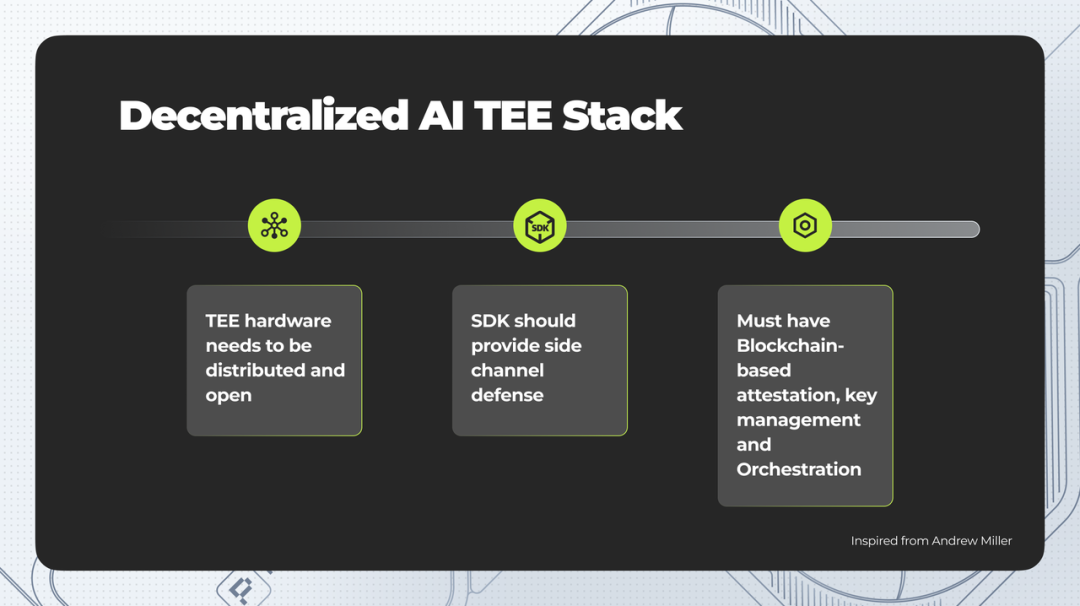
Hang Yin pointed out that TEE makes up for the shortcomings of zero-knowledge proof in performance and privacy protection. TEE uses a hardware sandbox mechanism to ensure that the program is not manipulated or leaks information during execution, thus providing a safer solution for decentralized AI and other complex computing scenarios.
In Web3 applications, TEE applications are mainly concentrated in three areas:
The MEV (Maximum Extractable Value) project solves transaction sorting and privacy protection issues through TEE;
In the field of deep defense , TEE is used to improve the security of multi-party computing (MPC) and zero-knowledge proof;
Decentralized front-end and back-end , achieving full decentralization by processing off-chain computing and edge functions.
These applications make TEE an important tool for developers to achieve greater efficiency, security, and privacy protection in Web3.
Advancing privacy protection and blockchain integration of AI agents through TEE technology
Earlier this year, decentralized AI made key progress. Although its potential is widely recognized, achieving truly decentralized AI still faces challenges. Hang Yin, founder of Phala Network, pointed out: "The implementation of decentralized AI is not only complex, but also requires solving the difficult problems of computational verifiability and privacy protection."
For example, a challenge facing the decentralized GPU market is how to ensure the quality of the GPU resources provided. Hang Yin explained: "It is very difficult to distinguish between high-end GPUs and consumer-grade GPUs. Only through cross-validation can the reliability of the calculation results be ensured."
In terms of privacy protection, this problem can be effectively solved by introducing a trusted execution environment (TEE). Hang Yin said: "TEE can run AI models in a protected environment to ensure the verifiability of the computing process and data privacy, which is especially suitable for Crypto economy-related applications." Currently, Nvidia's H-100 is the only GPU that supports TEE. It works in conjunction with CPU TEE to provide comprehensive privacy protection for AI computing.
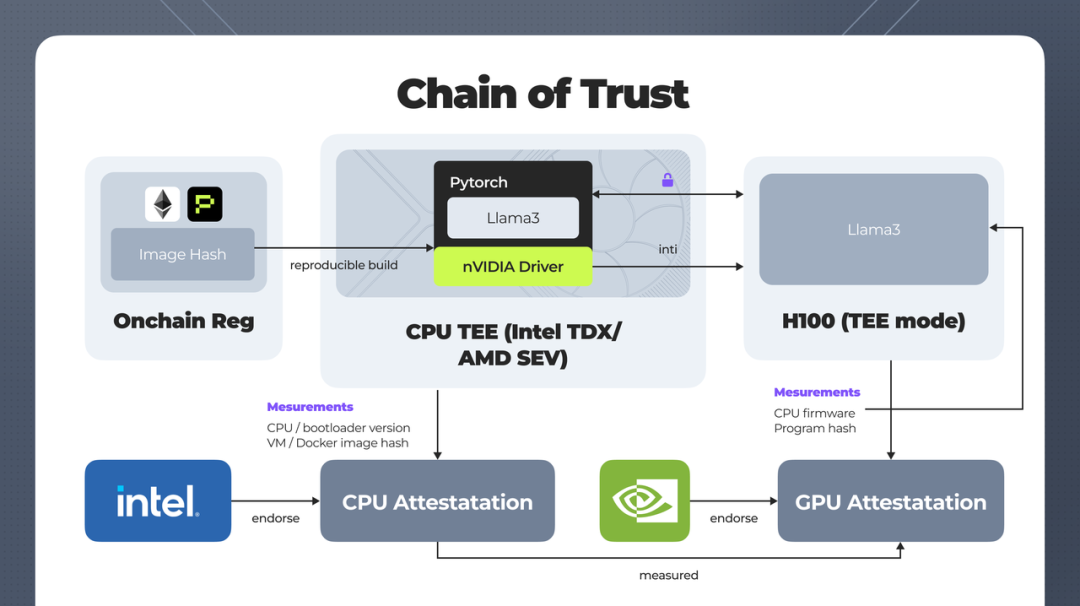
Phala Network has begun working with multiple projects, such as Morpheus AI, to provide decentralized AI hosting services using TEE technology to ensure model execution and data privacy. In the future, Phala Network plans to expand this functionality and launch tutorials to help developers create fully verifiable and privacy-preserving AI agents, and achieve deep integration with blockchain to enhance functionality and application scenarios.
Use RedPill templates to build and manage AI agent contracts
Based on the understanding of TEE core technology, how to build proxy contracts is also a question of great concern. As a blockchain platform for trusted execution environment (TEE), Phala Network achieves security and privacy protection of off-chain computing by writing AI proxy contracts in TypeScript and compiling them into JavaScript and uploading them to IPFS. Users can interact with the contract through GET and POST requests.
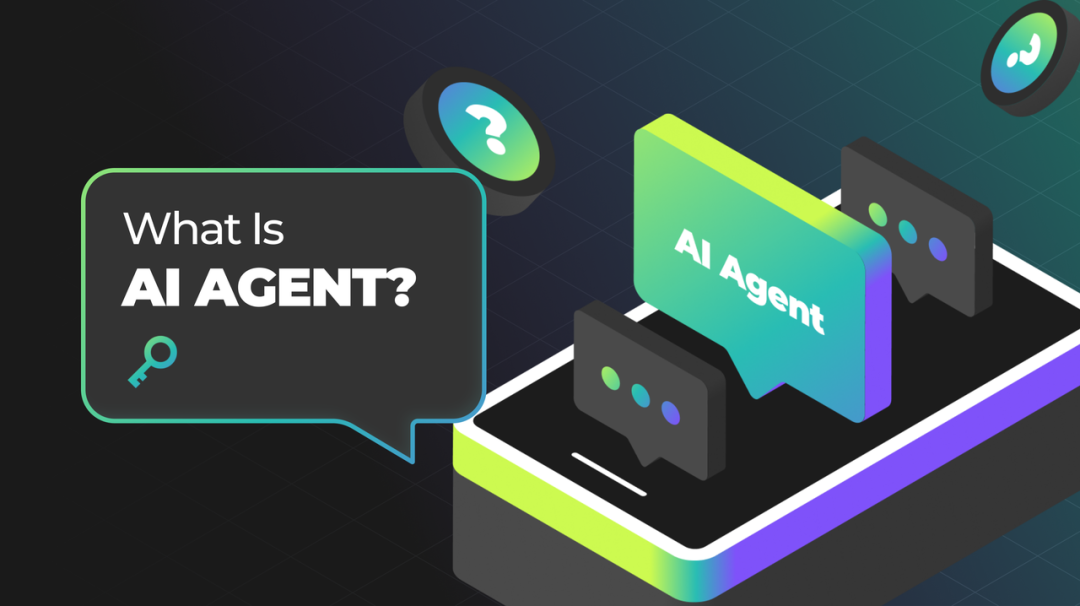
Joshua Waller introduced the RedPill template , which acts as a language model router and simplifies the selection and use of multi-language models by providing API keys. He demonstrated how to build an AI proxy contract using the RedPill template and showed how to clone the template repository on GitHub, set the API key, and upload the proxy contract to IPFS.
During the demonstration, Joshua Waller showed how to use pnpm to install project dependencies, create a .env file, copy and set the API key, and introduced how to manage the usage of the API key, including creating a new key and viewing the API usage record. It also demonstrated how to build a proxy contract, set up a GET request for local testing, and publish the contract to IPFS.
Joshua Waller emphasized the key steps in testing and releasing proxy contracts, including defining and selecting models, handling transactions and signature verification, and checking the correctness of requests through logging and curl commands. These steps ensure the reliability of the functionality and interaction of the proxy contract.
Phala plans to promote TEE technology and decentralized AI in the future
Through Joshua Waller's further interpretation of the technology, we also learned about the significant progress Phala Network has made in TEE (Trusted Execution Environment) technology. In the past, it took a month to develop a TEE application, but now through the SDK, users can convert applications into TEE containers in a few minutes, greatly simplifying development and deployment.
Phala Network now supports CPU and GPU TEEs, facilitating the construction of decentralized AI training and reasoning systems, and meeting the high demand for decentralized AI and Web3 applications. Hang Yin said that the launched AI proxy contract is similar to AWS Lambda, but fully decentralized, and users can develop in JavaScript or TypeScript and run computing workloads on the platform. Phala Network is also developing an SDK to convert Docker containers into TEE-ready containers, and plans to launch an easy-to-use decentralized cloud platform. These initiatives are expected to be implemented in the next quarter, further promoting the development of TEE technology and decentralized AI.

In the final session, Joshua Waller shared some use cases, showing how to build innovative applications using the RedPill AI proxy contract template. Here are a few examples:
AI Agent Contract: Similar to an HTTP server, it can connect to various APIs such as Brian, Pond Alora, Chainba, and even OpenAI and Anthropic models. Integration can be completed in just a few lines of code.
Function call: By obtaining the latitude and longitude of the Te node and querying the weather forecast, AI can recommend activities in Austin, etc.
AI Use Cases
Twitter data analysis : Generate interactive robots to analyze tweets on Twitter.
Social Engineering White Hat Agent: Develop a phishing link generator to test social engineering attacks.
Custom algorithm: Create the mygovid algorithm, upload the proxy contract to the website, and conduct Web3 social networking.
IDE Extension: Crypto Rewards Extension that allows contributing code through the IDE and earning cryptocurrency.
Collaborative Token: Enables multi-agent collaborative systems such as intent-based trading and prediction markets.
Ad Generation: Generate Facebook ads and get tags and royalties.
The examples show how the tools provided can be used to drive creativity and develop innovative and useful products.
In this issue of TinTinAMA and TinTinMeeting, experts from Phala Network demonstrated how TEE technology can improve the security and privacy protection of decentralized applications, especially in the field of AI. By introducing the construction of AI proxy contracts and the use of RedPill templates, Phala Network demonstrated its powerful capabilities in simplifying the transition from Web2 to Web3. This in-depth discussion and demonstration not only enhanced the understanding of the potential of TEE, but also made people look forward to the future development of decentralized technology.
















